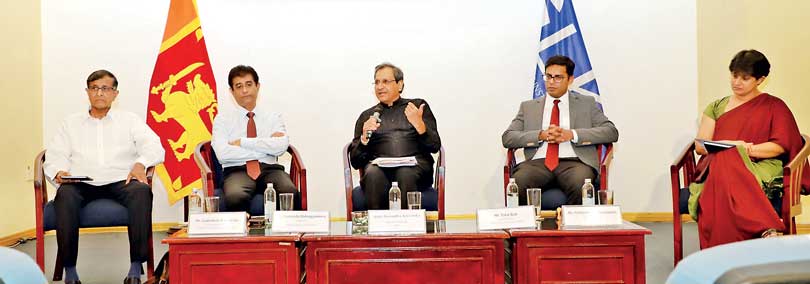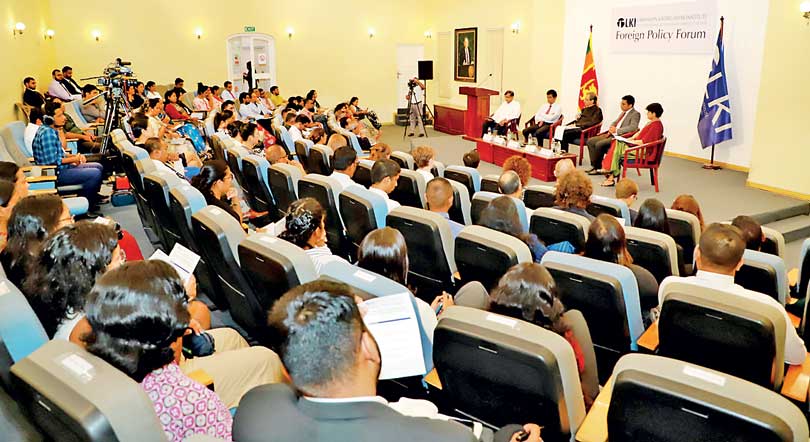Monday Feb 23, 2026
Monday Feb 23, 2026
Tuesday, 16 July 2024 00:04 - - {{hitsCtrl.values.hits}}

LKI Executive Director Ambassador Ravinatha Aryasinha (third from right) gestures during the panel discussion he moderated. Others from left are Overseas Development Institute Visiting Senior Fellow Dr. Ganeshan Wignaraja, Ceylon Chamber of Commerce Chairman Duminda Hulangamuwa, World Economic Forum Economist and Expert Member Talal Rafi, and Verité Research, Research Director Subhashini Abeysinghe

The fourth LKI Foreign Policy Forum, which highlighted the outcome of Sri Lanka’s debt restructuring and its impact on economic diplomacy and foreign policy, was held on Thursday 11 July at the Lighthouse Auditorium of the Lakshman Kadirgamar Institute of International Relations and Strategic Studies (LKI).
Sri Lanka’s imperative need to enact growth-oriented reforms particularly in governance, build consensus among all political parties on the reforms implemented and a foreign policy that leverages economic diplomacy, as well as modalities for sustained economic growth was emphasised.
Held on a quarterly basis, LKI’s flagship ‘Foreign Policy Forum’ brings together experts to discuss contemporary foreign policy issues and to contribute to the development of a Sri Lankan perspective on foreign policy and international relations. Moderated by LKI Executive Director Ambassador Ravinatha Aryasinha, the four-member panel included Overseas Development Institute Visiting Senior Fellow Dr. Ganeshan Wignaraja, Ceylon Chamber of Commerce Chairman Duminda Hulangamuwa, World Economic Forum Economist and Expert Member Talal Rafi, and Verité Research, Research Director Subhashini Abeysinghe.
Ramifications of recent debt restructuring
Assessing the ramifications of the recent debt restructuring outcome, Ambassador Ravinatha Aryasinha said the proposed mechanisms and recommendations in the ‘IMF Sri Lanka Diagnostics Report’, could help overcome longstanding challenges experienced by Sri Lanka’s economic diplomacy due to internal bottlenecks – the absence of policy and regulation consistency, the allegation of lack of transparency and corruption, the need for a level playing field, the need for expansion of the basket of commodities and increasing the value added component in exports. He added that unblocking these, could prompt Sri Lanka’s external partners to also review their policies towards Sri Lanka – opening up markets, resuming aid projects, easing the adverse Organisation for Economic Co-operation and Development (OECD) credit rating and other indices, as well as relax the adverse travel advisories on Sri Lanka.
Dr. Ganeshan Wignaraja cautioned that Sri Lanka’s economic recovery is taking place in an era of uncertainty as the world enters a stage of geo-economic fragmentation. He stressed that the key to transformative growth lies in looking beyond the IMF program and re-tuning for growth-oriented reforms within Sri Lanka. He warned that although successfully surviving the worst economic crisis in the country’s history, Sri Lanka’s economy remains fragile, and complete recovery demands that Sri Lanka reach consensus on a long-term reform agenda. He added that foreign policy will play a critical role in Sri Lanka’s economic recovery and emphasised the need to be “extremely surgical about our national interests and economic security.”
Duminda Hulangamuwa noted that a rise in the financial ratings of the country will cast a more positive outlook on the economy which will have a beneficial impact for the people of Sri Lanka. He added that the biggest contributor to kickstart Sri Lanka’s economy would be reviving stalled bilateral projects, which would increase circulation of currency in the market. He suggested capitalising on Sri Lanka’s potential as a shipping and logistics hub, greater investment in infrastructure tourism and an enhanced focus on the IT and BPO industry would contribute to accelerating economic growth towards complete recovery. He noted that discussions are ongoing with the government and opposition parties on the policy recommendations outlined in the recently published ‘Vision 2030’ policy document of the Ceylon Chamber of Commerce, with the hope that it would support reaching an economic consensus on the way forward
Talal Rafi saw debt restructuring as providing the breathing space needed to implement critical reforms for a sustainable economy, until 2029. He stressed that the Government in power should not become comfortable with the four years at hand before repayment obligations begin. He explained that, to succeed as India and Thailand did when undergoing economic reforms, Sri Lanka needs to accurately diagnose its problems and rely on the support of other nations.
Subhashini Abeysinghe said debt restructuring is not the end, it is actually the beginning. She noted that even previously although there have been many efforts for reform, vested interests, corruption and weaknesses in governance have hindered the progress. She further stated that the debt restructuring period is a time for Sri Lanka to address these roadblocks, or else economic reforms will not succeed. She stressed that economic reforms cannot succeed without reforms in governance, and further that infrastructure development alone is not enough to achieve the growth Sri Lanka aspires for, and that institutional and regulatory reforms are crucial. She also called for a shift in attitudes, particularly towards foreign investment that requires international talent and investment, noting that Sri Lanka cannot afford to look at the world as a threat and must take hold of opportunities available through partnerships.
Prospects of change
The question and answer session that followed focused on; the prospects of change through enacting the proposed Economic Transformation Bill, the need for restructuring existing State-Owned Enterprises (SOEs) that are not generating profits including SriLankan Airlines, the need for a clear, long-term FDI roadmap and establishment of a level playing field with transparency in procurement and in attracting investment consistent with the IMF Governance Diagnostic Assessment, and the need to de-politicise the reform process in order to ensure its sustainability.
Furthermore, the doubling of poverty levels since the economic crisis, the need to increase spending on healthcare and education, and also to accelerate development in the agriculture sector to ensure food security were also discussed. In the context that exclusivity was sought by different external actors over the various timeframes, the importance of Sri Lanka maintaining a levelled ‘playing field’ and being even-handed in its engagements in economic diplomacy and foreign policy was emphasised. Participating in the discussion representatives of Foreign Missions including South Korea, EU and Canada also shared their experiences in restructuring and perceptions on the proposed reforms, while pledging their commitment to continue supporting Sri Lanka’s economic recovery.